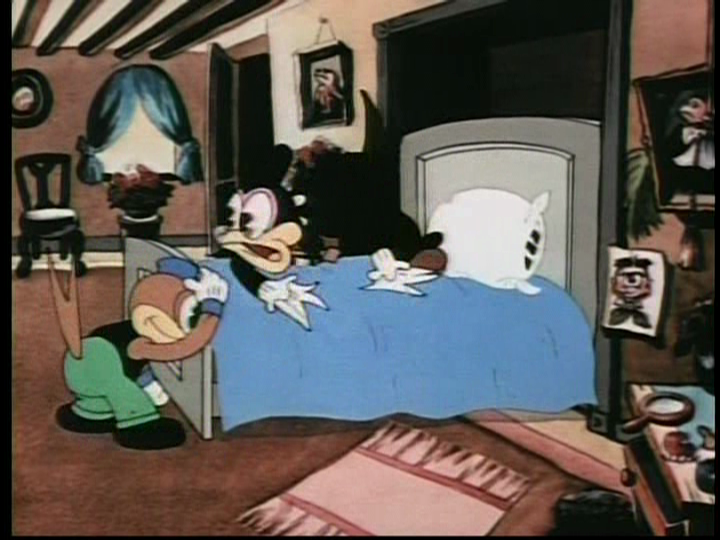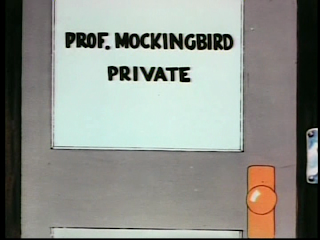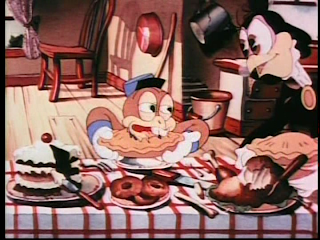 RELEASE DATE:
RELEASE DATE:3/6/1937 (according to the Big Cartoon Database; IMDb says 5/18/37)
DVD/BLU-RAY AVAILABILITY:
Available on the Warner Home Video DVD DAMES, released in 2006)
A reasonably good copy of this cartoon can be seen HERE (thanks for providing this, Devon Baxter!) As always, we recommend that you watch the cartoon before reading!
Frustrating cartoon, this. It comes right before Fred Avery's first bonafide masterpiece—one of the most revolutionary animated cartoons in American film. This cartoon is, quite frankly, not worthy of his talent or effort.
This is a pattern that recurs through Avery's career. Minor films precede major works; masterpieces are followed by half-assed also-rans. Avery was not a consistent creator of gems. By his nature, he couldn't be. A constant, fearless experimenter, each film an object-lesson in how much he could get away with (both with the studio brass and paying audiences), Avery had to take mis-steps.
More so than Chuck Jones or Bob Clampett, Avery walked off metaphorical cliffs, and courted abject failure, so that he could excel in his cinematic and comedic gifts.
I Only Have Eyes For You is exactly the kind of cartoon producer Leon Schlesinger wanted. It exploited a hot song (and a genuinely fine one—it's become a solid part of the Great American Songbook), and, on its surface, did nothing out of kilter. It could have been made by any of the units at Schlesinger's studio.
Avery would keep making such cartoons throughout his stay at Schlesinger's. There will be four more of these song-driven cartoons in the next year. They are replaced by the troublesome string of topical spot-gag cartoons in 1939. Your humble host looks forward to covering those cartoons as he would a spoonful of syrup of ipecac.
Avery's frustration is evident through-out this cartoon, and, if anything, it fuels a certain inventive flair. It introduces two major Avery motifs to the world: the genuinely unlikable protagonist and the pretentious, mega-entitled heroine. This female character speaks exclusively in the dulcet tones of Katherine Hepburn. She embodies all the puffery and self-importance of Hollywood—the thing Avery most loved to mock and deflate.
Hepburn had appeared in at least ten films by the time cartoon was in production, including spotlight roles in Little Women (1933) Alice Adams and Sylvia Scarlett (both 1935). Like Bette Davis and Greta Garbo, she was an ideal target for Avery's nose-thumbing satire.
The unappealing "hero" appears to be a cruel take-off of Schlesinger voice-man Joe Dougherty, who was phased out in favor of Mel Blanc by this time. The character's constant, knotted Spoonerisms can be seen as an expression of Avery's frustration with Dougherty.
We start in 1937-hip mode, with a jivy minor-key vocal chorus who fill us in on the story's spine:
Iceman (well-intentioned, stuttering schmo):
Is desired by nameless "old hag," a spinster beautifully voiced by gagman Tedd Pierce:
Iceman desires unobtainable, pretentious Katie Canary, who is obsessed with radio crooners.
Iceman approaches hag's home with extreme caution, knowing that he is about to experience sexual harassment on-the-job.
Iceman's first Spoonerism:
"Gy mosh! Er, uh, my gosh. This old maid pure is a shest... she sure is a pest!"
Indeed, she is. In a suspenseful moment, Iceman attempts to sneak into the belly of the beast, shown here as an assembled pan-shot.
She is now eerily absent from this seemingly tranquil interior. Iceman has every right to feel tense. He's been through this predator-prey routine too many times.
Wham! Horny old bird appears. She embodies the old saying "food is love." To her, food is the necessary come-on to a long-delayed roll in the hay. She offers Iceman an endless array of treats as she backs him into her bedroom.
(she lewdly winks as she offers him "cornbread an' sweet p'tatas")
Iceman has nowhere to run.
Old hag delivers her line, "At last... a MAN!" with a frightening intensity, and then dives under the bed, one thing very clearly on her mind. Iceman objects vigorously!This is the first Avery instance of sexual attraction as horror movie motif. Due to the bland visual treatment, much of its innovation slips by un-noticed.
Deliverer delivers himself from a fate worse than bachelorhood! He rushes back to his ice truck and zooms away...
zipping back to issue the "Whew!" he forgot in his haste.
End of episode one.
Episode two:
Flowers in hand, Iceman calls on Katie Canary, with harp in his hote, er, hope in his heart...
...he might as well talk to the pictures on the wall; Katie's not here right now.
"Fleer's some howers..."
A Crosby-school crooner breaks through the static; Katie shushes this also-ran.
[crooner, from radio] "Don't lean on the radio, son. You bother me."
Iceman is sore, and has every right to be.
"That will be all for this period, folks..." a ray of hope for the passionate schmo.Katie will have nothing of non-crooner woo. "Please go away...cahn't you see I'm saving my heart and my love for a radio crooner?"
"Ahhh... some day, somewhere, some time, I shall marry one..."
"...and I know that we shall be oh so terribly happy..."
...
"...rally, I do."
Iceman suffers Loss of Sexual Status Metaphor No. 1: wilting flowers.Exit protagonist, stage right, flaccid and frustrated.
Iceman attempts to croon, and amusingly murders the 1936 pop hit "Let It Be Me..."
In Avery's world, solutions are as perfectly timed as crises.
In three slick static shots (the first a zoom-in), Avery lets signage do the heavy lifting.
This is a career-wide Avery trope: the lingering shot on a sign, newspaper headline or telegram that clues us in on what's going to happen.
Avery cleverly uses the sign on the door to connect us to the next sequence, as Iceman opens the barrier to reveal Professor Mockingbird, at his desk, contemplating a new mimicry.
You'll pardon me if I don't transcribe every Spoonerism the Iceman says, henceforth. Since you've watched the cartoon before reading this, and I want to get this blog posting done today, we'll cut to the chase.
Iceman receives a sensational display of Mockingbird's talents, which, in the Avery world, include having to physically inhabit the person, place or thing being imitated.
Best of all is Prof's version of an airplane, which involves pretzel-contortions of his torso.
Iceman's impressed, but he has a more important question, which he finally chokes out: Can ya croon?
A stellar. abridged rendition of the title track answers in the affirmative.
Mockingbird is jerked out the door...
and literally put on ice, in anticipation of the Iceman's feeble plans, which we already know too well.
Fade to black. Since Avery couldn't care less about creating a believable love story, the stakes here are appallingly low. The tedious formula comedy that follows nearly sinks the cartoon, but everything presented, so far, has built up to this moment, so we might as well get it over with...
Mockingbird's dulcet tones attract Katie to another window.
A nifty overhead POV shot shows us an apparently changed Iceman.
For those too dull to get the picture, another clever cutaway shot shows charlatan and singer in tandem hoax.
Katie is smitten.
[sighs deeply] "I knew he'd come; my lover, my sweet one..."
"Oh, at lahst, to be held in the arms of a crooner..."
"It will make me so sadly happy..."
"Really, it will."
This performance is a precursor to a more protracted (and hammier) scene in Avery's 1939 gem Hamateur Night. This puncture-of-pretense is important to his sensibility, and this first unleashing (complete with audience eye-contact) is a redemptive moment.
Let the unsuccessful ruse begin...
Hey, where'd that signal button come from?
The affect almost works.
Professor nears death; turns blue.
[to audience] "Boy, it's plenty cold in here!"
Sniffles, snorts and sneezes pepper Professor's performance, to Iceman's chagrin. Tipping his hat, in a pathetic gesture of good will, does nothing to restore Katie's broken trust.
The Professor literally blows his cover...
The jig is up!
As a voice yodels "So-o-o-o-o-o-o-o." we see the happily-ever-afters that redeem this cartoon.
Professor is nursed back to health by Katie Canary...
as workmen remove her radio...
and install an electric refrigerator. The Iceman's services are no longer needed.
A perverse zoom-in, as the lovebirds cuddle...
And one quick inter-title, as we fade in on the Iceman's domestic heaven and hell combined.
The old hag offers comfort foods beyond count...
...but at a price.
Oh, what a price!
The Iceman accepts this most ignoble of fates, and settles for a lifetime of love-making to this sex-starved old hag.In vain, he puts on dark glasses, as if that will dim the revulsion he must face between each bite of food, from now on...
"Well, lever the ness... forever a mess..."
"...well, anyhow, she can cook..."
and a dark curtain closes on this scene. "That's all Folks!" indeed...
I Only Have Eyes For You redeems itself in several places, but all of Avery's clever decorations and distractions fail to contain a general lack of inspiration.Admittedly, the stakes were higher, and restrictions were greater, in these costly Technicolor cartoons. These Merrie Melodies had to promote a song, lightly amuse their audience, and perhaps lead to sheet music and record sales of the plugged ditty therein.
Whether the cartoon was brilliant, funny or inventive didn't matter. If that happened, no one would complain, but the Merrie Melodies of this era, at their most typical, can be phoned-in sales pieces.
It's to the credit of the Avery unit that this cartoon is as funny and, in parts, grave as it is. The tension of the Iceman's first entrance of the old hag's home is striking. Although Avery was a reluctant sentimentalist, he does convey a certain desperation in the Iceman's search for love that hits home, beneath the character's cruel Spoonerisms and dimwitted wrong choices. His sad fate is both funny and brutal. Despite himself, this cipher lingers in our thoughts.
Avery will soon cease to make this type of cartoon. In the cheaper, less-monitored black and white Looney Tunes, his unit will soon level the playing field for aggressively cartoony cartoons.
NEXT: Porky's Game-Changer (introducing Daffy Duck).



























































































































































Ahem... Ice analysis and insights, Frank! I didn't realize that some cartoons were deliberately black and white -- I thought they were pre-color era. Fascinating. Your study is accumulating into the definitive work on this period of Abery's work, I'd say. Keep it rolling! Can't wait for your comments on the next masterpiece. Any thoughts on who those people are in them there pitchurs? They look like typical Warner Bros. celeb caricatures, but if so -- they are of people I don't recognize.
ReplyDeleteThanks, Paul! I do intend to keep this going. Making and processing an average of 160 screen captures per blog post makes these more time consuming in the grunt work department.
ReplyDeleteThose caricatures are, from left to right, Bing Crosby, Eddie Cantor, [unknown] and Rudy Vallee. The third one might be Russ Colombo. If so, all four were huge pop stars of the day.
I'll try to get another post done this month...
Great post, Frank! The "unknown" caricature is Al Jolson!
ReplyDeleteThank you, Mark! And, yes, that potato-shaped head could only be Jolson! It's interesting that Cantor and Jolson, two really old-school show-bizzers--- not crooners, by anyone's definition---are in Katie Canary's pantheon.
ReplyDeleteGiven Avery's admitted lack of joy at having to do the song-driven Merrie Melodies of the time period, the genesis of this one seems to simply be the word play between "Eyes" in the title song and "Ice" in our hero's job. The story itself is then built around that pun, in less than satisfying fashion by a director who's heart is only in the story for brief moments.
ReplyDeleteThe Icebird's voice in this cartoon was by Joe Twerp, who also provided a voice in "Porky and Teabiscuit". He was a little-known comic of the 1930s and 40s who specialized in the spoonerisms so liberally applied on the soundtrack of "I Only Have Eyes For You". He was born in 1910 and passed away in 1980. I don't know if Mike Barrier interviewed him for the book "Hollywood Cartoons" or not.
ReplyDeleteIt should have been called "I Only have Ice for you"...:) Mark K. is right, Joe Twerp did a handful of spose thoonerisms, I mean those spoonerisms, also done for many later Waul Pinchell I mean Paul Winchell characters...I've wondered what the lovestruck old hag';s theme was, it's catchy and appears near the iris-out. This reminds me a bit of "Cyrano De Beregerac". Steve
ReplyDeleteProfessor Mockingbird's greeting of "Hello, stranger!" is a reference to "Shlepperman", a character played by Sam Hearn on Jack Benny's radio show at the time- and his usual on air greeting (which reinforces the suggestion that Mockingbird is indeed a great imitator).
ReplyDelete